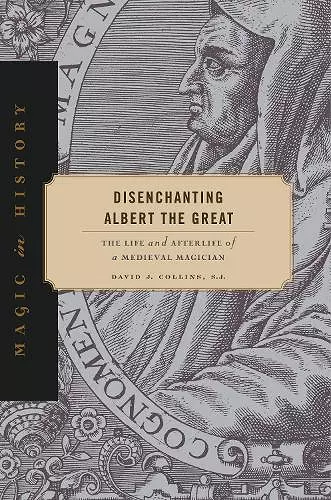Disenchanting Albert the Great
The Life and Afterlife of a Medieval Magician
Format:Hardback
Publisher:Pennsylvania State University Press
Published:11th Sep '24
Should be back in stock very soon

An illuminating examination of Albert the Great and the complex history of magic.
Albert the Great (1200–1280) was a prominent Dominican friar, a leading philosopher, and the teacher of Thomas Aquinas. He also endorsed the use of magic. Controversial though that stance would have been, Albert was never punished or repudiated for what he wrote. Albert’s reception followed instead a markedly different course, leading ultimately to his canonization by the Catholic Church in 1931. But his thoughts about magic have been debated for centuries. Disenchanting Albert the Great takes Albert’s contested reputation as a case study for the long and complex history surrounding the concept of magic and magic’s relationship to science and religion.
Over the centuries, Albert was celebrated for his magic, or it was explained away—but he was never condemned. In the fifteenth century, members of learned circles first attempted to distance Albert from magic, with the goal of exonerating him of superstition, irrationality, and immorality. Disenchanting Albert the Great discusses the philosopher’s own understanding of magic; an early, adulatory phase of his reputation as a magician; and the three primary strategies used to exonerate Albert over the centuries.
In the end, Disenchanting Albert the Great tells the story of a thirteenth-century scholar who worked to disenchant the natural world with his ideas about magic but who himself would not be disenchanted until the modern era. This accessible and insightful history will appeal to those interested in Albert the Great, Catholic Church history, the history of magic, and Western understandings of the natural and the rational over time.
“Albertus Magnus was a great churchman and theologian. He also, as David Collins shows, took a serious interest in magic, which he thought could explain natural processes. Albertus engaged with magic, as he explained, by reading texts but also by trying things out. As ideas about nature evolved, he played many roles in the thought of later periods, from magus to saint to rationalist. This lucid, learned, and thoughtful book is intellectual history at its best.”
—Anthony Grafton, author of Magus: The Art of Magic from Faustus to Agrippa
“David J. Collins has produced a superbly researched, cleverly written, and at times controversial analysis of Albert the Great’s postmortem reputation. It is a must-read for anyone interested in Albert, medieval or early modern magic and other esoterica, or premodern intellectual history more broadly.”
—Scott E. Hendrix, coeditor of Integrative Mysticism
“This is an interesting and erudite study that explores the shifting meanings of magic in Western society while questioning macronarratives about the disenchantment of the world.”
—D. A. Harvey Choice
ISBN: 9780271097442
Dimensions: 235mm x 156mm x 23mm
Weight: 522g
224 pages